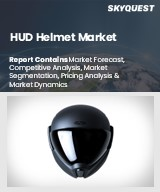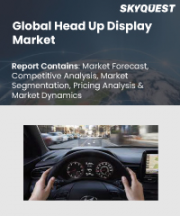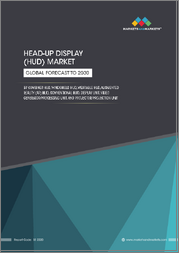
|
시장보고서
상품코드
1530767
HUD 헬멧 시장 예측(-2030년) : 커넥티비티, 컴포넌트, 디스플레이 기술, 아우터 쉘 재료, 기능, 최종사용자, 지역별 세계 분석HUD Helmet Market Forecasts to 2030 - Global Analysis By Connectivity, Component, Display Technology, Outer Shell Material, Function, End User and Geography |
||||||
Stratistics MRC에 따르면 세계의 HUD 헬멧 시장은 2024년에 2억 달러를 차지하고 예측 기간 중 CAGR 29.3%로 성장하며, 2030년에는 10억 달러에 달할 전망입니다.
HUD(헤드업 디스플레이) 헬멧은 사용자의 시야에 직접 투명 디스플레이를 통합하는 첨단 보호용 헤드 기어입니다. HUD 헬멧은 주로 군인과 모터스포츠에 사용되며, 최근에는 산업 환경에서도 사용되고 있으며, HUD 헬멧은 상황 인식을 향상시키고, 안전성을 향상시키고, 실시간 데이터를 제공하여 작업 효율을 높이는 동시에 사용자가 눈앞에서 작업할 수 있도록 도와줍니다. 실시간 데이터를 제공함으로써 작업 효율을 높이는 동시에 사용자가 눈앞의 환경에 집중할 수 있도록 도와줍니다.
미국 육군 연구소의 데이터에 따르면 "미 육군은 통합 시각 증강 시스템(IVAS) 개발에 5억 달러 이상을 투자했다"고 합니다. 이는 마이크로소프트의 홀로렌즈에 병사들을 위한 헤드업 디스플레이 기능이 내장된 군용 버전입니다.
라이더의 안전에 대한 관심 증가
라이더의 안전에 대한 관심이 높아지는 것은 HUD 헬멧 시장의 중요한 원동력입니다. 오토바이 사고가 계속해서 심각한 문제로 대두되고 있는 가운데, HUD 헬멧은 속도, 내비게이션, 사각지대 경고와 같은 중요한 정보를 라이더의 시야에 직접 표시하여 상황 인식을 강화합니다. 이 기술은 라이더가 중요한 데이터에 접근하면서 도로에서 눈을 떼지 않아도 되므로 사고를 줄이고 전반적인 안전성을 향상시킬 수 있습니다. 레크리에이션 라이더와 프로 라이더 모두 헬멧 채택이 증가함에 따라 시장 성장을 가속하고 있습니다.
높은 비용
HUD 헬멧과 관련된 높은 비용이 시장 성장의 주요 억제요인으로 작용하고 있습니다. 디스플레이, 센서, 연결 기능 등 헬멧에 통합된 첨단 기술은 기존 헬멧에 비해 가격을 크게 높입니다. 이러한 비용 장벽은 특히 가격에 민감한 소비자와 신흥 시장에서의 보급을 제한하고 있습니다. 또한 정비, 업그레이드 및 잠재적인 수리와 관련된 비용은 전체 소유 비용을 더욱 증가시켜 HUD 헬멧을 더 넓은 소비자층이 이용하기 어렵게 만듭니다.
높아지는 군적 수요
군용 HUD 헬멧에 대한 수요 증가는 시장 성장의 큰 기회로 작용하고 있습니다. 전 세계 군는 병사들의 상황 인식, 커뮤니케이션 및 전투 효과를 높이기 위해 첨단 헬멧 기술에 투자하고 있으며, HUD 헬멧은 전술 정보, 목표물 포착 데이터 및 실시간 전장 업데이트를 표시할 수 있으며, 병사들에게 현대 전쟁 시나리오에서 중요한 이점을 제공합니다.을 제공합니다. 군 예산이 확대되고 군인 현대화 프로그램에 초점을 맞추면서 국방 분야의 정교한 HUD 헬멧에 대한 수요가 시장 확대를 촉진할 것으로 예상됩니다.
개인정보 보호에 대한 우려
이러한 HUD 헬멧은 위치 정보, 속도, 잠재적인 생체 정보 등 다양한 데이터 포인트를 수집하고 처리합니다. 데이터 보안과 사용자 프라이버시에 대한 우려가 커지고 있습니다. 개인 정보에 대한 무단 액세스 및 수집된 데이터의 악용 가능성은 규제 당국의 감시와 사용자의 망설임으로 이어질 수 있습니다. 제조업체는 소비자의 신뢰를 유지하고 잠재적인 시장 둔화를 방지하기 위해 강력한 데이터 보호 조치와 투명한 개인 정보 보호 정책을 통해 이러한 우려를 해결해야 합니다.
COVID-19의 영향 :
COVID-19는 처음에는 공급망 문제와 소비자 지출 감소로 인해 HUD 헬멧 시장을 혼란에 빠뜨렸습니다. 그러나 비접촉식 기술 채택과 개인 안전에 대한 관심이 높아지면서 HUD 헬멧에 대한 장기적인 수요를 촉진할 수 있었습니다. 전염병은 혁신적인 안전 솔루션의 중요성을 강조하고 경제가 회복되고 소비자 신뢰가 회복되면 시장의 미래 성장을 가속할 수 있습니다.
예측 기간 중 독립형 부문이 가장 큰 비중을 차지할 것으로 예상됩니다.
독립형 부문은 범용성과 외부 장비로부터의 독립성으로 인해 시장을 독점할 것으로 예상됩니다. 이 헬멧은 디스플레이, 센서, 처리 장비 등 필요한 모든 컴포넌트를 헬멧 자체에 내장하고 있습니다. 이 독립형 설계는 더 높은 신뢰성, 사용 편의성 및 다양한 산업 분야에 대한 광범위한 적용 가능성을 제공합니다. 독립형 HUD 헬멧은 원활한 작동과 외부 의존도를 최소화하는 것이 중요한 전문 및 군용 용도에서 특히 매력적이며 시장 점유율을 확대하고 있습니다.
열가소성 복합재료 분야는 예측 기간 중 가장 높은 CAGR을 나타낼 것으로 예상됩니다.
열가소성 복합재료 부문은 HUD 헬멧 시장에서 가장 높은 성장률을 보일 것으로 예상됩니다. 이 소재는 강도, 경량 특성 및 설계 유연성의 최적의 균형을 제공하여 첨단 헬멧 구조에 이상적입니다. 열가소성 복합재료는 구조적 무결성과 내충격성을 유지하면서 복잡한 전자 부품을 통합할 수 있습니다. 또한 성형 및 재활용이 용이하여 지속가능성에 대한 관심이 높아지는 추세에 부합합니다. 제조업체들이 헬멧의 성능 향상과 경량화를 추구함에 따라 열가소성 복합재료의 채택은 빠르게 가속화될 것으로 예상됩니다.
가장 큰 점유율을 차지하는 지역
아시아태평양은 여러 가지 요인으로 인해 HUD 헬멧 시장에서 가장 큰 점유율을 차지할 것으로 보입니다. 이 지역에서는 특히 인도와 중국과 같은 국가에서 오토바이 시장이 빠르게 성장하고 있으며, 이는 첨단 안전 기술에 대한 큰 수요를 창출하고 있습니다. 또한 가처분 소득 증가, 도시화, 교통안전에 대한 정부의 구상도 시장 성장에 기여하고 있습니다. 일본과 한국과 같은 국가에는 대형 전자제품 제조업체와 자동차 제조업체가 존재하여 HUD 헬멧 분야의 기술 혁신과 생산을 촉진하고 아시아태평양 시장 지배력을 더욱 공고히 하고 있습니다.
CAGR이 가장 높은 지역 :
아시아태평양은 HUD 헬멧 시장에서 가장 높은 성장률을 보일 것으로 예상됩니다. 이 지역의 빠른 기술 도입 속도, 도시 인구 증가, 교통안전에 대한 인식이 높아짐에 따라 이 지역의 빠른 성장에 힘입은 바 큽니다. 동남아시아 신흥 국가에서는 오토바이 이용이 급증하고 있으며, 이는 HUD 헬멧 제조업체에 새로운 기회를 제공합니다. 또한 이 지역 전체에서 군 현대화 프로그램에 대한 투자가 증가하고 있으며, 이는 첨단 헬멧 기술에 대한 수요를 촉진하고 있습니다. 이러한 요인들이 결합되어 아시아태평양은 HUD 헬멧 시장의 성장을 가속화하고 있습니다.
무료 커스터마이즈의 제공
본 리포트를 구독하는 고객은 아래의 무료 커스터마이즈 옵션 중 하나를 이용할 수 있습니다. :
- 기업 개요
- 추가 시장 기업의 종합적 프로파일링(최대 3사)
- 주요 기업의 SWOT 분석(최대 3사)
- 지역 세분화
- 고객의 관심에 따른 주요 국가의 시장 추산·예측·CAGR(주 : 타당성 확인에 따라 다름)
- 경쟁 벤치마킹
- 제품 포트폴리오, 지역적 프레즌스, 전략적 제휴에 기반한 주요 기업의 벤치마킹
목차
제1장 개요
제2장 서문
- 개요
- 이해관계자
- 조사 범위
- 조사 방법
- 데이터 마이닝
- 데이터 분석
- 데이터 검증
- 조사 어프로치
- 조사 정보원
- 1차 조사 정보원
- 2차 조사 정보원
- 전제조건
제3장 시장 동향 분석
- 촉진요인
- 억제요인
- 기회
- 위협
- 최종사용자 분석
- 신흥 시장
- COVID-19의 영향
제4장 Porter's Five Forces 분석
- 공급 기업의 교섭력
- 바이어의 교섭력
- 대체품의 위협
- 신규 진출업체의 위협
- 경쟁 기업 간 경쟁 관계
제5장 세계의 HUD 헬멧 시장 : 커넥티비티별
- 스탠드얼론
- 접속
제6장 세계의 HUD 헬멧 시장 : 컴포넌트별
- 디스플레이 유닛
- 처리 유닛
- 센서
- 배터리
- 오디오 시스템
- 케이블
- 설치 하드웨어
제7장 세계의 HUD 헬멧 시장 : 디스플레이 기술별
- 증강현실(AR) 디스플레이
- 헤드 업 도파관 디스플레이
- 망막 투영 디스플레이
제8장 세계의 HUD 헬멧 시장 : 아우터 쉘 재료별
- 폴리카보네이트
- 열가소성 복합재료
- 기타 아우터 쉘 재료
제9장 세계의 HUD 헬멧 시장 : 기능별
- 내비게이션
- 통신
- 퍼포먼스 모니터링
- 안전 기능
제10장 세계의 HUD 헬멧 시장 : 최종사용자별
- 오토바이 라이더
- 사이클리스트
- 윈터 스포츠 애호가
- 군인
- 산업
- 기타 최종사용자
제11장 세계의 HUD 헬멧 시장 : 지역별
- 북미
- 미국
- 캐나다
- 멕시코
- 유럽
- 독일
- 영국
- 이탈리아
- 프랑스
- 스페인
- 기타 유럽
- 아시아태평양
- 일본
- 중국
- 인도
- 호주
- 뉴질랜드
- 한국
- 기타 아시아태평양
- 남미
- 아르헨티나
- 브라질
- 칠레
- 기타 남미
- 중동 및 아프리카
- 사우디아라비아
- 아랍에미리트
- 카타르
- 남아프리카공화국
- 기타 중동 및 아프리카
제12장 주요 발전
- 계약, 파트너십, 협업, 합병사업
- 인수와 합병
- 신제품 발매
- 사업 확대
- 기타 주요 전략
제13장 기업 프로파일링
- BAE Systems plc
- Thales Group
- Elbit Systems Ltd.
- Honeywell International Inc.
- Collins Aerospace
- Vuzix Corporation
- Microsoft Corporation
- Sony Corporation
- Garmin Ltd.
- Kopin Corporation
- Magic Leap, Inc.
- Meta Platforms, Inc.
- Seiko Epson Corporation
- Toshiba Corporation
- L3Harris Technologies, Inc.
- Schuberth GmbH
According to Stratistics MRC, the Global HUD Helmet Market is accounted for $0.2 billion in 2024 and is expected to reach $1.0 billion by 2030 growing at a CAGR of 29.3% during the forecast period. A HUD (heads-up display) helmet is an advanced protective headgear that incorporates a transparent display directly in the user's field of vision. It projects crucial information such as speed, navigation, or system status without requiring the wearer to look away from their usual viewpoint. Primarily used by military personnel, motorsports, and increasingly in industrial settings, HUD helmets enhance situational awareness, improve safety, and boost operational efficiency by providing real-time data while allowing the user to maintain focus on their immediate environment.
According to the data from the U.S. Army Research Laboratory, "The U.S. Army has invested over $500 million in the development of the Integrated Visual Augmentation System (IVAS), a militarized version of Microsoft's HoloLens that incorporates heads-up display capabilities for soldiers."
Market Dynamics:
Driver:
Increased concern for safety of riders
The growing emphasis on rider safety is a key driver for the HUD helmet market. As motorcycle accidents continue to be a significant concern, HUD helmets offer enhanced situational awareness by displaying critical information like speed, navigation, and blind spot warnings directly in the rider's field of view. This technology allows riders to keep their eyes on the road while accessing important data, potentially reducing accidents and improving overall safety. The increasing adoption of these helmets by both recreational and professional riders is fueling market growth.
Restraint:
High cost
The high cost associated with HUD helmets is a major restraint for market growth. The advanced technology integrated into these helmets, including displays, sensors, and connectivity features, significantly increases their price compared to traditional helmets. This cost barrier limits widespread adoption, particularly among price-sensitive consumers and in emerging markets. Additionally, the expenses related to maintenance, upgrades, and potential repairs further contribute to the overall cost of ownership, making HUD helmets less accessible to a broader consumer base.
Opportunity:
Growing military demand
The increasing demand for HUD helmets in military applications presents a significant opportunity for market growth. Armed forces worldwide are investing in advanced helmet technologies to enhance soldier situational awareness, communication, and combat effectiveness. HUD helmets can display tactical information, target acquisition data, and real-time battlefield updates, giving soldiers a crucial edge in modern warfare scenarios. As military budgets expand and focus on soldier modernization programs, the demand for sophisticated HUD helmets in the defense sector is expected to drive market expansion.
Threat:
Privacy concerns
These HUD helmets collect and process various data points, including location, speed, and potentially biometric information. There are growing concerns about data security and user privacy. The potential for unauthorized access to personal information or misuse of collected data could lead to regulatory scrutiny and user hesitation. Manufacturers must address these concerns through robust data protection measures and transparent privacy policies to maintain consumer trust and prevent a potential market slowdown.
Covid-19 Impact:
The COVID-19 pandemic initially disrupted the HUD helmet market due to supply chain issues and reduced consumer spending. However, it also accelerated the adoption of contactless technologies and increased focus on personal safety, potentially boosting long-term demand for HUD helmets. The pandemic highlighted the importance of innovative safety solutions, which could drive future growth in the market as economies recover and consumer confidence returns.
The standalone segment is expected to be the largest during the forecast period
The standalone segment is projected to dominate the market due to its versatility and independence from external devices. These helmets integrate all necessary components, including displays, sensors, and processing units, within the helmet itself. This self-contained design offers greater reliability, ease of use, and broader applicability across various industries. Standalone HUD helmets are particularly attractive in professional and military applications where seamless operation and minimal external dependencies are crucial, driving their larger market share.
The thermoplastic composites segment is expected to have the highest CAGR during the forecast period
The thermoplastic composites segment is anticipated to grow at the highest rate in the HUD helmet market. These materials offer an optimal balance of strength, lightweight properties, and design flexibility, making them ideal for advanced helmet construction. Thermoplastic composites enable the integration of complex electronic components while maintaining structural integrity and impact resistance. Their ability to be easily molded and recycled also aligns with growing sustainability concerns. As manufacturers seek to improve helmet performance and reduce weight, the adoption of thermoplastic composites is expected to accelerate rapidly.
Region with largest share:
Asia Pacific is poised to hold the largest share of the HUD helmet market due to several factors. The region's rapidly growing motorcycle market, especially in countries like India and China, creates a substantial demand for advanced safety technologies. Additionally, increasing disposable incomes, urbanization, and government initiatives promoting road safety contribute to market growth. The presence of major electronics and automotive manufacturers in countries like Japan and South Korea also drives innovation and production in the HUD helmet sector, further solidifying Asia Pacific's market dominance.
Region with highest CAGR:
Asia Pacific is also expected to experience the highest growth rate in the HUD helmet market. This rapid growth is fueled by the region's fast-paced technological adoption, expanding urban populations, and rising awareness of road safety. Emerging economies in Southeast Asia are witnessing a surge in motorcycle usage, creating new opportunities for HUD helmet manufacturers. Moreover, increasing investments in military modernization programs across the region are driving demand for advanced helmet technologies. The combination of these factors positions Asia Pacific for accelerated growth in the HUD helmet market.
Key players in the market
Some of the key players in HUD Helmet market include BAE Systems plc, Thales Group, Elbit Systems Ltd., Honeywell International Inc., Collins Aerospace, Vuzix Corporation, Microsoft Corporation, Sony Corporation, Garmin Ltd., Kopin Corporation, Magic Leap, Inc., Meta Platforms, Inc., Seiko Epson Corporation, Toshiba Corporation, L3Harris Technologies, Inc., and Schuberth GmbH.
Key Developments:
In June 2023, three-year collaboration has been established between Saab and Honeywell, a leading aerospace and defense company. The agreement sets out a partnership between the two companies to develop and strengthen Honeywell's Head-Up Display (HUD) product line. The collaboration will last for three years, during which time Saab and Honeywell will work together to make the HUD readily available for the market.
In May 2023, Honeywell Aerospace recently reached a significant milestone within its Honeywell Anthem Integrated Flight Deck program. The aerospace developer operated its first flight using the new avionics. This system could have a successful introduction to a variety of industry segments, from commercial aviation to defense and more.
Connectivity's Covered:
- Standalone
- Connected
Components Covered:
- Display Unit
- Processing Unit
- Sensors
- Battery
- Audio System
- Cables
- Mounting Hardware
Display Technologies Covered:
- Augmented Reality (AR) Display
- Head-up Waveguide Display
- Retinal Projection Display
Outer Shell Materials Covered:
- Polycarbonate
- Thermoplastic Composites
- Other Outer Shell Materials
Functions Covered:
- Navigation
- Communication
- Performance Monitoring
- Safety Features
End Users Covered:
- Motorcycle Riders
- Cyclists
- Winter Sports Enthusiasts
- Military Personnel
- Industrial
- Other End Users
Regions Covered:
- North America
- US
- Canada
- Mexico
- Europe
- Germany
- UK
- Italy
- France
- Spain
- Rest of Europe
- Asia Pacific
- Japan
- China
- India
- Australia
- New Zealand
- South Korea
- Rest of Asia Pacific
- South America
- Argentina
- Brazil
- Chile
- Rest of South America
- Middle East & Africa
- Saudi Arabia
- UAE
- Qatar
- South Africa
- Rest of Middle East & Africa
What our report offers:
- Market share assessments for the regional and country-level segments
- Strategic recommendations for the new entrants
- Covers Market data for the years 2022, 2023, 2024, 2026, and 2030
- Market Trends (Drivers, Constraints, Opportunities, Threats, Challenges, Investment Opportunities, and recommendations)
- Strategic recommendations in key business segments based on the market estimations
- Competitive landscaping mapping the key common trends
- Company profiling with detailed strategies, financials, and recent developments
- Supply chain trends mapping the latest technological advancements
Free Customization Offerings:
All the customers of this report will be entitled to receive one of the following free customization options:
- Company Profiling
- Comprehensive profiling of additional market players (up to 3)
- SWOT Analysis of key players (up to 3)
- Regional Segmentation
- Market estimations, Forecasts and CAGR of any prominent country as per the client's interest (Note: Depends on feasibility check)
- Competitive Benchmarking
- Benchmarking of key players based on product portfolio, geographical presence, and strategic alliances
Table of Contents
1 Executive Summary
2 Preface
- 2.1 Abstract
- 2.2 Stake Holders
- 2.3 Research Scope
- 2.4 Research Methodology
- 2.4.1 Data Mining
- 2.4.2 Data Analysis
- 2.4.3 Data Validation
- 2.4.4 Research Approach
- 2.5 Research Sources
- 2.5.1 Primary Research Sources
- 2.5.2 Secondary Research Sources
- 2.5.3 Assumptions
3 Market Trend Analysis
- 3.1 Introduction
- 3.2 Drivers
- 3.3 Restraints
- 3.4 Opportunities
- 3.5 Threats
- 3.6 End User Analysis
- 3.7 Emerging Markets
- 3.8 Impact of Covid-19
4 Porters Five Force Analysis
- 4.1 Bargaining power of suppliers
- 4.2 Bargaining power of buyers
- 4.3 Threat of substitutes
- 4.4 Threat of new entrants
- 4.5 Competitive rivalry
5 Global HUD Helmet Market, By Connectivity
- 5.1 Introduction
- 5.2 Standalone
- 5.3 Connected
6 Global HUD Helmet Market, By Component
- 6.1 Introduction
- 6.2 Display Unit
- 6.3 Processing Unit
- 6.4 Sensors
- 6.5 Battery
- 6.6 Audio System
- 6.7 Cables
- 6.8 Mounting Hardware
7 Global HUD Helmet Market, By Display Technology
- 7.1 Introduction
- 7.2 Augmented Reality (AR) Display
- 7.3 Head-up Waveguide Display
- 7.4 Retinal Projection Display
8 Global HUD Helmet Market, By Outer Shell Material
- 8.1 Introduction
- 8.2 Polycarbonate
- 8.3 Thermoplastic Composites
- 8.4 Other Outer Shell Materials
9 Global HUD Helmet Market, By Function
- 9.1 Introduction
- 9.2 Navigation
- 9.3 Communication
- 9.4 Performance Monitoring
- 9.5 Safety Features
10 Global HUD Helmet Market, By End User
- 10.1 Introduction
- 10.2 Motorcycle Riders
- 10.3 Cyclists
- 10.4 Winter Sports Enthusiasts
- 10.5 Military Personnel
- 10.6 Industrial
- 10.7 Other End Users
11 Global HUD Helmet Market, By Geography
- 11.1 Introduction
- 11.2 North America
- 11.2.1 US
- 11.2.2 Canada
- 11.2.3 Mexico
- 11.3 Europe
- 11.3.1 Germany
- 11.3.2 UK
- 11.3.3 Italy
- 11.3.4 France
- 11.3.5 Spain
- 11.3.6 Rest of Europe
- 11.4 Asia Pacific
- 11.4.1 Japan
- 11.4.2 China
- 11.4.3 India
- 11.4.4 Australia
- 11.4.5 New Zealand
- 11.4.6 South Korea
- 11.4.7 Rest of Asia Pacific
- 11.5 South America
- 11.5.1 Argentina
- 11.5.2 Brazil
- 11.5.3 Chile
- 11.5.4 Rest of South America
- 11.6 Middle East & Africa
- 11.6.1 Saudi Arabia
- 11.6.2 UAE
- 11.6.3 Qatar
- 11.6.4 South Africa
- 11.6.5 Rest of Middle East & Africa
12 Key Developments
- 12.1 Agreements, Partnerships, Collaborations and Joint Ventures
- 12.2 Acquisitions & Mergers
- 12.3 New Product Launch
- 12.4 Expansions
- 12.5 Other Key Strategies
13 Company Profiling
- 13.1 BAE Systems plc
- 13.2 Thales Group
- 13.3 Elbit Systems Ltd.
- 13.4 Honeywell International Inc.
- 13.5 Collins Aerospace
- 13.6 Vuzix Corporation
- 13.7 Microsoft Corporation
- 13.8 Sony Corporation
- 13.9 Garmin Ltd.
- 13.10 Kopin Corporation
- 13.11 Magic Leap, Inc.
- 13.12 Meta Platforms, Inc.
- 13.13 Seiko Epson Corporation
- 13.14 Toshiba Corporation
- 13.15 L3Harris Technologies, Inc.
- 13.16 Schuberth GmbH



















